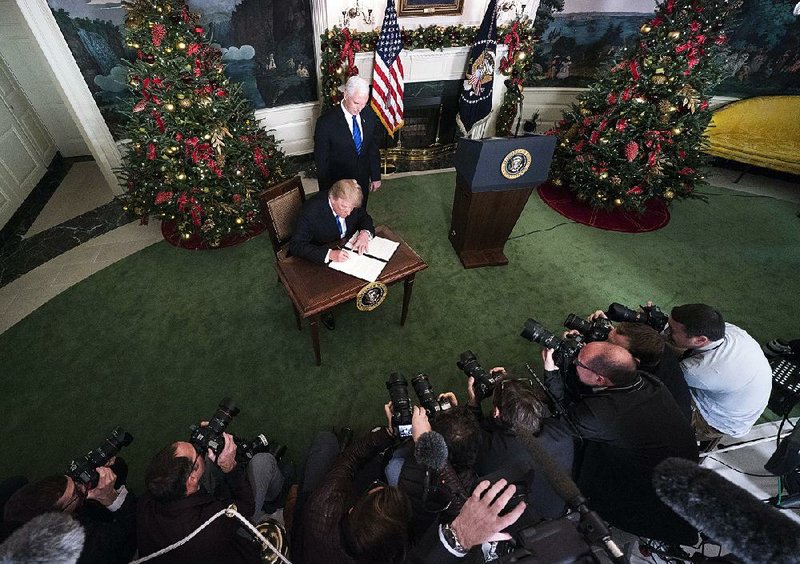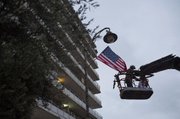WASHINGTON -- President Donald Trump on Wednesday formally recognized Jerusalem as the capital of Israel, reversing nearly seven decades of U.S. foreign policy and setting in motion a plan to move the U.S. Embassy from Tel Aviv to the contested Holy City.
"Today we finally acknowledge the obvious: that Jerusalem is Israel's capital," Trump said at the White House. "This is nothing more or less than a recognition of reality. It is also the right thing to do. It's something that has to be done."
The president cast his decision as a break with decades of failed policy on Jerusalem, which the United States, along with virtually every other nation in the world, has declined to recognize as the capital since Israel's founding in 1948. That policy, he said, brought us "no closer to a lasting peace agreement between Israel and the Palestinians."
"It would be folly to assume that repeating the exact same formula would now produce a different or better result," Trump declared.
[PRESIDENT TRUMP: Timeline, appointments, executive orders + guide to actions in first 200 days]
Recognizing Jerusalem, he added, was "a long overdue step to advance the peace process."
No government beyond Israel spoke up in praise of Trump or suggested it would follow his lead.
Israelis and Palestinians reacted in starkly different terms. Prime Minister Benjamin Netanyahu hailed Trump's announcement as an "important step toward peace," and Israeli opposition leaders echoed his praise. But Palestinian President Mahmoud Abbas said Trump's shift serves extremist groups that want religious war and signals U.S. withdrawal from being a peace mediator. Protesters in Gaza burned American and Israeli flags.
Trump's remarks were the most closely scrutinized of his presidency in regard to the Middle East, where he has vowed to broker the "ultimate deal" between Israelis and Palestinians but has yet to find a breakthrough to end the conflict. He said he remained committed to brokering an agreement "that is a great deal for the Israelis and a great deal for the Palestinians."
The president said the decision to recognize Jerusalem should not be construed as the United States taking a position on whether, or how, the city might ultimately be shared. But he offered little solace to the Palestinians, making no mention of their long-held hopes for East Jerusalem to be the capital of a Palestinian state.
Instead, Trump emphasized the domestic political dimension of the decision. He noted that he had promised to move the embassy during the 2016 presidential campaign, and added, "While previous presidents have made this a major campaign promise, they failed to deliver. Today, I am delivering."
Though he did not mention it, Trump signed the same national security waiver signed by his predecessors, from Barack Obama to George W. Bush to Bill Clinton, that will allow the administration to keep the embassy in Tel Aviv for an additional six months. White House officials said that was unavoidable because it would take several years to move the embassy staff to a new facility in Jerusalem.
On Wednesday Trump focused on his directive to the State Department to begin a process of moving the embassy as required by U.S. law, however many years that might take. After his speech, he signed a proclamation to that effect. In Germany, Secretary of State Rex Tillerson said work will begin immediately to identify a site.
"There will, of course, be disagreement and dissent regarding this announcement," the president said. He appealed for "calm, for moderation, and for the voices of tolerance to prevail over the purveyors of hate."
Trump's recognition of Jerusalem isolates the U.S. on one of the world's most sensitive diplomatic issues. It has drawn a storm of criticism from Arab and European leaders, which swelled Tuesday night after White House officials confirmed Trump's plans.
Pope Francis and the Chinese Foreign Ministry joined the chorus of voices warning that the move could unleash a wave of violence across the region. At a meeting in Brussels, Tillerson was sternly reproached by European allies.
Standing next to Tillerson, the European Union's top diplomat, Federica Mogherini, made clear that Europe saw the president's decision as a threat to peace in the Middle East.
"We believe that any action that would undermine these efforts must absolutely be avoided," she said. "A way must be found through negotiations to resolve the status of Jerusalem as a future capital of both states."
Just hours before Trump made his announcement, Tillerson said peace in the Middle East was still possible. Tillerson, during a news conference at NATO headquarters in the heart of Europe, expressed reassurances about the expected consequences of the decision.
"The president's very committed to the Middle East peace process," said Tillerson, who has been largely shut out of the usual back-and-forth between Israelis and Palestinians that many secretaries of state spent much of their tenures conducting. Trump instead entrusted that task to his son-in-law and senior adviser, Jared Kushner.
U.S. embassies and consulates around the world were put on high alert. Across the Middle East and Europe, they issued warnings to Americans to watch out for violent protests. In Jordan, home to a large Palestinian population, the U.S. said it would close its embassy to the public today and urged children of diplomats there to stay home from school.
Trump's promise to move the embassy appealed to evangelical voters and pro-Israel American Jews, including Sheldon Adelson, the Las Vegas casino magnate. By delivering on that promise, Trump's aides said, he was enhancing his credibility as a peacemaker.
The announcement, officials said, was recognition of current and historic reality. West Jerusalem is the seat of Israel's government, and recognizing it as such would remove ambiguity from the U.S. position, they said.
Former Arkansas Gov. Mike Huckabee and Robert Jeffress, senior pastor at First Baptist megachurch in Dallas, released statements of praise on Wednesday.
Trump also drew bipartisan support on Capitol Hill from Republicans and some Democrats.
Sen. Marco Rubio, R-Fla., called the announcement "an important step in the right direction" and added that "unequivocal recognition of Jerusalem as Israel's capital will be complete when the U.S. Embassy is officially relocated there."
Rep. Eliot Engel of New York, the top Democrat on the House Foreign Affairs Committee, said the decision "helps correct a decades-long indignity."
But House Minority Leader Nancy Pelosi, D-Calif., called Trump's move premature and warned of "mass protests," as other Democrats also criticized the announcement.
"President Trump's decision to formally recognize Jerusalem as Israel's capital today appears to be driven more by his desire to fulfill a campaign pledge than to generate progress towards direct peace talks," said Sen. Christopher Coons, D-Del., a member of the Senate Foreign Relations Committee.
Jerusalem is one of the world's most fiercely contested pieces of real estate, with each side disputing the other's claims. Palestinians view East Jerusalem as the capital of a future Palestinian state, and most of the world considers it occupied territory. Jerusalem's Old City has the third-holiest mosque in Islam and the holiest site in Judaism, making the city's status a sensitive issue for Muslims and Jews alike. Jerusalem is also sacred ground to Christians.
In addition to declining to take a position on the ultimate shape of Jerusalem, Trump called for the status quo on a disputed area of the Old City, known as the Temple Mount to Jews and the Noble Sanctuary to Muslims, which has been a flash point for tensions.
Information for this article was contributed by Mark Landler of The New York Times; by Matthew Lee, Bradley Klapper, Josef Federman, Karin Laub and Josh Lederman of The Associated Press; and by David Nakamura, Joby Warrick, Rick Noack, Loveday Morris, Ruth Eglash and Carol Morello of The Washington Post.
RELATED ARTICLE
http://www.arkansas…">Palestinians protest; Israelis voice fears on move
A Section on 12/07/2017

